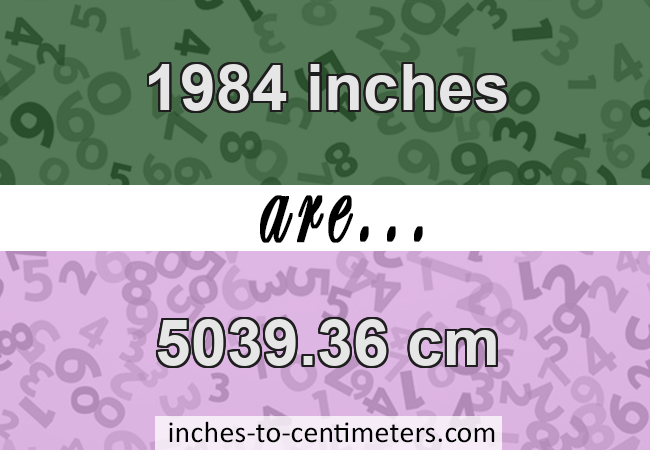To convert 1984 inches to cm, multiply the length in inches by 2.54
Formula:
1984 in x 2.54 cm = 5039.36 cm
How long is 1984 inches?
To convert inches to centimeters, you can use the following conversion:
1 inch = 2.54 cm
One inch equals 2.54 centimeters, so 1984 inches will equal 5039.36 cm.
If we have a measurement given in inches and want to convert it to centimeters, we can multiply that measurement in inches by 2.54.
This relationship is used to convert length measurements between imperial units and metric units.
To convert a measurement in inches to centimeters, first convert the feet to inches using the formula above. Then, add the number of inches to the result to get the total number of inches. Finally, multiply the total number of inches by 2.54 to convert the measurement to centimeters.
How many cm is 1984″?
There are 2.54 centimeters in one inch, so 1984 inches is equal to 1984″ x 2.54cm = 5039.36 centimeters
Conversion from One Thousand Nine Hundred Eighty Four Inch to Centimeters
The conversion factor from inches to centimeters is 2.54. Knowing this, all you need is a calculator to convert to 1984 inches. Or better yet: you calculate in your head. No matter how you do the conversion, the result should be as follows:
1984″ equals 5039.36 centimeters
1984 Inches to CM Conversion Table
| IN | CM | Conversion |
|---|---|---|
| 1983.5 | 5038.09 | 1983.5 inches to cm |
| 1983.6 | 5038.344 | 1983.6 inches to cm |
| 1983.7 | 5038.598 | 1983.7 inches to cm |
| 1983.8 | 5038.852 | 1983.8 inches to cm |
| 1983.9 | 5039.106 | 1983.9 inches to cm |
| 1984 | 5039.36 | 1984 inches to cm |
| 1984.1 | 5039.614 | 1984.1 inches to cm |
| 1984.2 | 5039.868 | 1984.2 inches to cm |
| 1984.3 | 5040.122 | 1984.3 inches to cm |
| 1984.4 | 5040.376 | 1984.4 inches to cm |
| 1984.5 | 5040.63 | 1984.5 inches to cm |
Conversions near 1984 inches
This conversion table provides the conversions between inches (in) and meters (cm) for quick and easy reference.
| IN | CM | Conversion |
|---|---|---|
| 1974 | 5013.96 | 1974 in to cm |
| 1975 | 5016.5 | 1975 in to cm |
| 1976 | 5019.04 | 1976 in to cm |
| 1977 | 5021.58 | 1977 in to cm |
| 1978 | 5024.12 | 1978 in to cm |
| 1979 | 5026.66 | 1979 in to cm |
| 1980 | 5029.2 | 1980 in to cm |
| 1981 | 5031.74 | 1981 in to cm |
| 1982 | 5034.28 | 1982 in to cm |
| 1983 | 5036.82 | 1983 in to cm |
| 1984 | 5039.36 | 1984 in to cm |
| 1985 | 5041.9 | 1985 in to cm |
| 1986 | 5044.44 | 1986 in to cm |
| 1987 | 5046.98 | 1987 in to cm |
| 1988 | 5049.52 | 1988 in to cm |
| 1989 | 5052.06 | 1989 in to cm |
| 1990 | 5054.6 | 1990 in to cm |
| 1991 | 5057.14 | 1991 in to cm |
| 1992 | 5059.68 | 1992 in to cm |
| 1993 | 5062.22 | 1993 in to cm |
| 1994 | 5064.76 | 1994 in to cm |
Definition of Inch
The inch, signified by ” or “in,” is a unit of measurement in the Anglo-American System of Measurement, which is used in the US, Canada, and other parts of the Caribbean. This unit is also seen in other countries for technical products, such as the size of screens and screws. Its basis is the width of a thumb or finger.
Definition of Centimeter
The Metric System’s chief unit of length is the Meter, with the Centimeter, represented by “cm”, stemming from it. This is equivalent to 0.01 Meters, or 10 Millimeters, and is a measurement employed worldwide.
Other questions solved about 1984 inches
- Can you provide an example of how to use the formula for converting inches to centimeters with 1984 inches as the starting value?
- What is the conversion factor for inches to centimeters, and how does it apply to the conversion of 1984 inches to centimeters?
- What is the result of using the conversion factor to convert 1984 inches to centimeters?
- How do I apply the conversion factor for inches to centimeters to calculate the equivalent measurement in centimeters for 1984 inches?
- What is the numerical value of the conversion rate for inches to centimeters when applied to 1984 inches?
- How many centimeters are equivalent to 1984 inches according to the conversion factor?
- What is the result of using the conversion chart to find the equivalent measurement in centimeters for 1984 inches?

